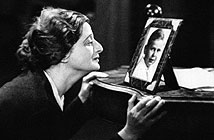|
|
|
|
Mamadrama
|
 |
|
Melbourne filmmaker Monique Schwarz tackles the rich topic of the Jewish mother in cinema from various angles – historical, cultural and personal – in her modest but engaging film-essay, Mamadrama. On one level, it is an attempt at documenting a particular film history. Screen images of Jewish mothers, in this account, fall into three distinct eras: Yiddish musicals of the '30s and '40s; American comedies of the '60s and '70s; and contemporary Israeli cinema. The path that Schwarz takes is through personal memory and experience rather than strict chronology. She begins with the shock of seeing, in her youth, films like Where's Poppa (1970) and Portnoy's Complaint (1972), with their blackly comic depictions of shrill, overbearing, neurotic mothers. There are interviews in Hollywood with the men who wrote and directed such movies, including Paul Mazursky and Paul Bogart. Some defend their acts of caricature as part of the '60s ethos of rebellion against parental authority; others seem pretty ashamed at the mere mention of the topic. Schwarz clearly has little fondness for the strident pop culture of the '60s – the gap between reality and cinema is too nagging. When it comes to the Yiddish musicals, however, she is willing to accommodate a large slice of sentimental fantasy. The best part of Mamadrama is the footage from these too-rarely seen gems – although I was disconcerted by the enormous subtitles that sometimes blot out half the image. Again, the explanation for this aesthetic preference is personal: for Schwarz, the emotion of these old films is associated with memories of her beloved mother, a Holocaust survivor. In touching clips from one of Schwarz's early shorts, we glimpse this striking, dignified figure. Finally, we are whisked off to Israel for a potted portrait of contemporary Israeli cinema, which even in its comedies takes a more realistic look at women and family life. Tellingly, these filmmakers rarely invoke the Jewish mother as an abstract social category; they are more interested in providing a testament to individual women and their values. The trip allows the filmmaker a way of negotiating her own cultural and religious heritage. In some respects, this is a fairly conventional documentary – clips plus talking heads. Experts including American critic Jim Hoberman expound their views in a mostly pithy fashion, although I could have done with less of that odd family-values ideologue, Michael Medved. Schwarz uses well-worn, tele-doco devices – such as a washy musical score and an actor reading the first-person, voice-over narration – that inevitably dilute the personal, intimate thrust of the project. Nonetheless, Mamadrama manages to be a poignant and satisfying work. Since the Melbourne Film Co-Op days of the '70s, Schwarz has always tried to broaden conventional documentary form without losing its real-world immediacy and accessibility. As a filmmaker, her sense of colour, rhythm and movement gives the "dramatic recreations" and montages of archival footage a welcome poetic touch, as in her previous doco, Bitter Herbs and Honey (1996). Ultimately, Schwarz's exploration of the personal documentary fits well with her ongoing investigation of Jewishness. Her films have long given expression to a modern idea of Jewish identity: pleasurably adrift in a materialistic world, but also longing to make some connection with the past and its traditions. The essay film turns out to be the perfect medium for this tentative and fragmented quest, as Schwarz pastes together a scattered self-portrait from all the voyages, researches and encounters she has accumulated. MORE Australian documentary: Facing the Music, One Way Street, Carlton + Godard = Cinema, Wildness, Mademoiselle and the Doctor, Original Schtick MORE Australian women's independent cinema: Dreams for Life, Travelling Light, The Good Looker, Vacant Possession © Adrian Martin October 2001 |
![]()